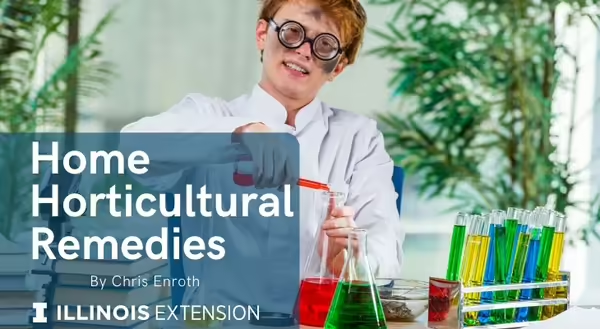
Home remedies abound in the horticultural world. Some gardeners swear by their mixtures of a little bit of this and a little bit of that, but Extension does not readily recommend the use of homemade pesticides. Perhaps your anti-Japanese beetle potion warded off the critters last year. But what if you get the amount of ingredients out of balance next time or what is happening in the long-term to your plants, soil, and environment? Salt and vinegar are two common ingredients in many purported weed remedies found on the internet. Contrary to some beliefs that the internet never lies, just remember that any Joe Shmoe (or Jane Shmoe for that matter) can post something on the World Wide Web.
Vinegar is reported to be an old-world herbicide, used for generations. Plus, vinegar is sold commercially as an herbicide treatment. Now let’s distinguish kitchen vinegar and vinegar-based herbicides. Dosing dandelions or purslane with vinegar from your kitchen cabinet means all you’re missing is some olive oil for a nice salad. Simply put, kitchen vinegar does not make a good herbicide. The concentration of acetic acid, a compound found in kitchen vinegar, is typically around 5%. A concentration that low is just not strong enough to kill any but the smallest of weed seedlings.
Higher concentrations of acetic acid are marketed commercially in vinegar herbicide formulations. Often these are billed as organic options to conventional chemical herbicides. Vinegar herbicides are effective against young seedlings and annuals somewhat. But acetic acid does not translocate to other plant parts, therefore any perennial weed or weed with a well-established root system can regrow. Additionally, the contact kill delivered by the vinegar herbicide affects soil microbes and soil pH, though studies show these effects are often minimal and short-lived. Yet, some effects can be long-term for the occasional unlucky amphibian or insect hiding in your targeted weeds.
So just how much acetic acid is required to be effective? According to Michelle Wiesbrook, University of Illinois Extension weed specialist, studies indicate that acetic acid concentrations of 10 to 20% provide effective weed control in the range of 80 to 100%. Homeowners should note that concentrations of acetic acid this high are incredibly harmful to humans. Any contact with the skin and eyes causes’ irreversible corrosion and damage, meaning gloves and goggles are a must when using vinegar herbicides. Just because a product is labeled as ‘organic’ or ‘natural’ does not mean it is harmless, but that’s another article.
Salt is another common ingredient found in homemade weed killers and has been used for centuries. If we crack open our history books, we will read that a key weapon used by ancient armies was salting the fields of their enemies. Sure, salt does the trick in knocking down weeds, but what are the long-term effects? Salt is soluble and thus highly mobile in your soil allowing it to spread to areas planted with desirable vegetables and ornamentals, damaging them along with your weeds.
It is always best to leave the homemade concoctions where you found them on the internet and opt for commercially available products that have been tested and registered with the EPA. The testing required by the EPA determines both the benefits and adverse effects of pesticides. And of course, always follow label directions. Pesticide labels are there to ensure the proper use of the product which protects you and the environment. If you have questions about what pesticide is well-suited to your situation, feel free to contact your local Extension office.
Good Growing Tip of the Week: One remedy to high salt levels in your garden bed is to leach the material out of the top layer of soil with repeated soakings of water. Fortunately, for both vinegar and salt, the effects of using these in the landscape are not long-term and can be remediated.
Want to get notified when new Good Growing posts are available? SIGN UP HERE!
Check out Extension weed specialist, Michelle Wiesbrook's article on home weed control remedies http://hyg.ipm.illinois.edu/article.php?id=466